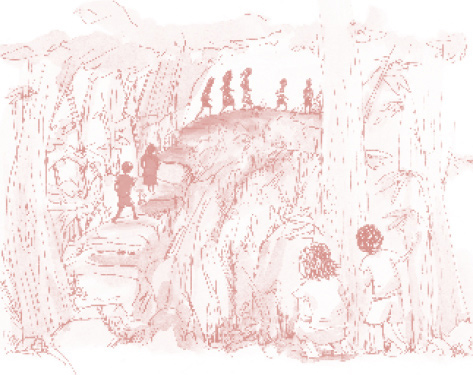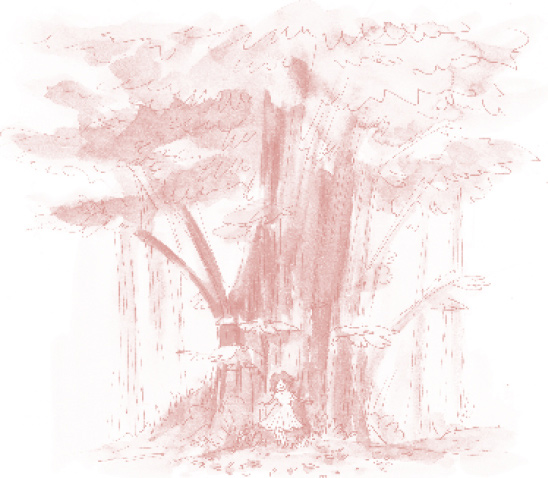Mountain of Fire
Authors: Radhika Puri


MOUNTAIN OF FIRE
BY RADHIKA PURI
ILLUSTRATED BY NUO
Contents
For Naila, who will have
her own adventures.
Stay happy. Stay blessed
ONE: THE SILENT WALK THROUGH THE FOREST
The forest has many sounds, loud in the quiet of the night.
Yet on this full moon night, the insects ceased to buzz and the trees seemed to stand still, almost at attention. They seemed to know what was at stake for these 20 men and women walking through the forest in complete silence.
Eleven-year-old Fitri and her brother, nine-year-old Agus, had been following this group for almost an hour. But it seemed like forever. They were desperate to somehow slip ahead. But it had to be done quietly, without anyone spotting them. So far they had been lucky; the two kids knew just how to blend behind every rock, tree and boulder, and become invisible in the forest.

Cold, prickly branches reached out, scratching against their skin. But the children did not notice much other than the outline of the mountain looming in the distance. Gunung Merapi was not just any mountain. Merapi meant Fire Mountain. It was one of the most dangerous volcanoes in Indonesia â and the world.
Fitri and Agus were born in the village Machuchak on the southern slopes of Mount Merapi.
The Merapi had been a friend to Fitri's village, and to the others around the mountainside, for hundreds of years. The volcanic ash was good for the soil. Many families could grow their crops and live off the land.
Fitri and Agus had lived next to the volcano all their lives, and had never been scared of it. The volcano sometimes thundered and rumbled, but never like this. A week ago something had changed. Deep, deep inside the volcano, something was happening. The Merapi was awake and angry.
Both their parents were a part of the group walking through the forest that night. They were on the
Tapak Bisu,
the Silent Walk. It was a ceremony to calm down the Merapi, and it had to be done in total silence at midnight on a full moon night. Absolutely no children were allowed! Fitri and Agus were breaking at least a dozen rules simply by being there.
I'm going to get it if Ayah finds out I'm running around here in the middle of the night,
Fitri thought nervously. She knew she would be in a hundred different kinds of trouble.
This would not be the first time. Just last month there had been the “disaster” at school.
Fitri was often in trouble and most of her escapades had to do with her brother. She had spent her life protecting Agus from the village bullies. Agus was a shy, quiet boy who kept to himself because he had been born with a funny face. It was not funny in a good way, but funny in a bad way. His upper lip looked like a knife had cut into it and carved out an entire piece. It made his face look odd and even ugly. But worse because his lip was only half there, he covered his mouth constantly with his hand, and he mumbled instead of speaking.

Just last month, Aditya, an older boy from the village, had yelled out, “
Raksasa!” â
meaning demon or monster â to Agus and tripped him at school. The school yard burst out laughing and Agus looked like he wanted to just disappear into nothing.
Fitri had felt a hot rage boiling up inside her and she went crazy. She grabbed Aditya's hand and dunked it into an anthill. Aditya's yells brought out the entire school, including the principal. His hand ballooned into the size of a small ball and Fitri landed up in detention for a month at school. She still cringed when she remembered how angry her father had been.
Fitri tripped on a stone, stubbing her toe, and snapped her attention back to the mountain. Their mother had told them many stories about the last major eruption, which occurred before Fitri was born. The story was the stuff of nightmares: fascinating, dreadful, and deadly. Hot mud came down the slopes of the mountain with such speed that it snapped trees like thin twigs, destroyed buildings, houses and everything that lay in its way. Hundreds of people were killed.
Every child in the village had heard these stories. Everyone had someone â a parent, a grandparent, an uncle or aunt â who had seen the last eruption and lost someone. Growing up on these tales, Fitri and her friends played a game called “The Zombies are Coming”. The children pretended that the volcano had erupted and the lava was chasing them and had burnt off their skins.
But these games had stopped; they did not seem funny anymore. Now the nightmare seemed real.
Agus and Fitri had NEVER seen so much smoke coming out of the volcano. “What do you think is wrong with it?” asked Agus, staring at the smoking crater. “Is it sick?”
“Not sick, just very angry. Ibu says the Merapi was angry once like this many years ago,” said Fitri.
“What happened then?” asked Agus, wide-eyed.
“The
wedus gembel
came down from the mountain and killed some people.”
Wedus
meant sheep and
gembel
meant thick, curly hair in Javanese. She parroted her mother's words, “Don't worry. It's not time to worry yet.” But did she even believe it herself? Fitri's village was just 10 kilometres from the crater. If the thick, curly, wool-like smoke started coming out of the mountain, that meant trouble for sure!
The Merapi rumbled loudly in the distance and Fitri paused to listen. Someone in the group tripped and fell. Everyone froze and Fitri, 20 feet behind, ducked behind a tree, grabbed her brother, and stayed very still.
“Silence,” said a voice in the darkness.
The girl knew that voice well. It was Bapak Eko, the Spiritual Guardian of the Merapi, the most important person in the group that night. Fitri could not see who had stumbled, but the ceremonial plate and its contents were scattered all over the forest floor.
Fitri and Agus crouched, waiting for the group to start walking again. She took Agus' hands, rubbed them together with hers to warm them in the cold mountain air, and thought of the past two weeks.
So much had happened. It had all started with the dreams.
TWO: THE TREE IN THE DREAM
Nine days before the Tapak Bisu
A girl twirled under a tree. Round and round. Faster and faster.
As she twirled, her skirt twirled around with her. The colours of autumn â orange, brown, red, yellow and gold â fell on the girl, on her face and on her hair. Her face was turned up towards the sky and her eyes were closed.
A gentle wind picked up and the leaves moved with the girl. Faster and faster, until the girl was lost in a whirling mass of colours.
Still Fitri twirled. And the leaves fell around her.

But now, slowly, light was trying to get into her eyes. She shut her eyes tight to escape the light. She wasn't done twirling and she didn't want to open her eyes. But light cannot be stopped and it gets where it wants to go. She opened her eyes and stopped twirling.
Through the moving leaves she could see something on the ground, something shining, yellow and glinting. She started to go near it, to try and touch it, but just as she came near the thing on the ground, someone held her hand and shook her.
Fitri opened her eyes and found Ibu by her bed, shaking her gently. “Time to get up for school,” said her mother.
Fitri rubbed her eyes and slowly rose up from her bed. What a strange dream! The girl in the dream seemed to be her. The tree, the leaves falling, and the shiny item on the ground. What did it all mean? A small shiver ran up her spine.
Her little brother was still fast asleep next to her. Fitri's wooden bed lay next to an open window. Agus' was on the other side of the room. Her family was relatively better off than the other families in the village. They lived in a brick house with two rooms and a tiny area, which served as a living room. Her father was the village handyman, fixing televisions and water pumps.
She looked out of the window in her room and expected to see the Merapi looking the same as it did every morning. Instead, she jolted awake and ran to her mother.
“Ibu, look at that!” said Fitri, pointing to the volcano.
“Yes, I know. It's probably nothing.”
“How can you say that, Ibu! There is so much smoke coming out of the volcano!”
“Yes, Fitri, your father has gone up the mountain with some men to have a look.
Tidak apa masalah.
There is no problem. Now get ready for school and be quiet. Don't wake up your brother,” Ibu said.
Fitri knew instantly her mother was lying. She could make out from the way she was hiding her face and the way she never turned around to look at Fitri. Grown-ups think that kids don't know when they are hiding something, but kids always do.
Ibu caught Fitri looking at her and said, “Are you listening, Fitri? Go straight to school. Do NOT go up the mountain.” Ibu's warning was well placed. She knew her daughter would often do the exact opposite of what was expected of her.
And she was right.
The school was about half a kilometre outside the village. Most mornings she and Agus got a ride to school on her father's motorcycle. But today, Agus was not well and her father had gone up the mountain to check on the Merapi. She would have to walk to school. That suited her plan just fine.
Knowing her mother would be watching her, Fitri set out in the right direction.
At this time of the morning, there were barely any people on the road. Just a few motorcycles sputtering by. Fitri waited at the village entrance where a large signpost read:
Selamat Datang di Kampong Machuchak.
Welcome to the village Machuchak. She waited till the last motorcycle had passed by her and then quickly ducked into the fields. She picked her way carefully through the strip of land between the rice fields and started doubling back towards the village.